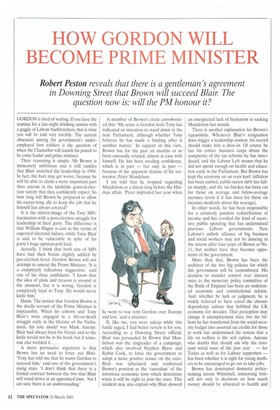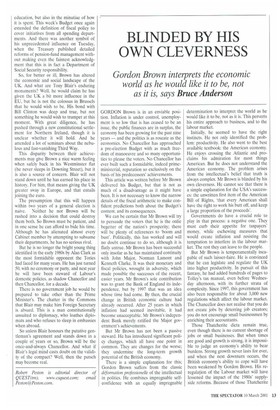HOW GORDON WILL BECOME PRIME MINISTER
Robert Peston reveals that there is a gentleman's agreement
in Downing Street that Brown will succeed Blair The question now is: will the PM honour it?
GORDON is tired of waiting. If you have the stamina for a late-night drinking session with a gaggle of Labour backbenchers, that is what you will be told very forcibly. The current obsession among the government's underemployed foot soldiers is the question of when the Chancellor will launch his putsch to be come leader and prime minister.
Their reasoning is simple. Mr Brown is immensely ambitious and it still rankles that Blair snatched the leadership in 1994. In fact, the hurt may get worse, because he will be able to claim a more important part than anyone in the landslide general-election victory that they confidently expect. So how long will Brown be prepared to allow his career-long ally to keep the job that he himself has always coveted?
It is the mirror-image of the Tory MPs' fascination with a post-election struggle for leadership of their party. The difference is that William Hague is cast as the victim of expected electoral failure, while Tony Blair is said to be vulnerable in spite of his party's huge opinion-poll lead.
Actually, I think that both sets of MPs have had their brains slightly addled by pre-election fever. Gordon Brown will not attempt to unseat the Prime Minister. 'It is a completely ridiculous suggestion,' said one of his close confidants. 'I know that the idea of plots and treason is around at the moment, but it is wrong. Gordon is completely loyal to Tony. He would never knife him.'
Hmm. The notion that Gordon Brown is the docile servant of the Prime Minister is implausible. When his cohorts and Tony Blair's were engaged in a life-or-death struggle early in the lifetime of the Parliament, his role model was Mark Antony: Blair had always been his friend, and so the knife would not be in his hand, but if someone else wielded it. .
A more persuasive argument is that Brown has no need to force out Blair. 'Tony has told me that he wants Gordon to succeed him,' said one of the government's rising stars. 'I don't think that there is a formal contract between the two that Blair will stand down at an appointed time, but I am sure there is an understanding.'
A member of Brown's circle corroborated this: 'My sense is Gordon feels Tony has indicated an intention to stand down in the next Parliament, although whether Tony believes he has made a binding offer is another matter.' In support of this view, Brown has for the past six months or so been unusually relaxed, almost at ease with himself. He has been exuding confidence, which is in part — but only in part — because of the apparent demise of his tormentor, Peter Mandelson.
I am told that he stopped regarding Mandelson as a threat long before the Hinduja affair. 'Peter imploded last year when he went to war with Gordon over Europe and lost,' said a minister.
If, like me, you were asleep while this battle raged, I had better review it for you. According to a Downing Street official, Blair was persuaded by Brown that Mandelson was the ringleader of a campaign, which also involved Stephen Byers and Robin Cook, to force the government to adopt a more positive stance on the eura. Blair was infuriated and reinforced Brown's position as the 'custodian' of the notorious economic tests which determine when it will be right to join the euro. This incident may also explain why Blair showed an unexpected lack of hesitation in sacking Mandelson last month.
There is another explanation for Brown's equanimity. Whenever Blair's resignation does trigger a leadership contest, his record should make him a shoo-in. Of course he has his critics: business carps about the complexity of the tax reforms he has introduced, and the Labour Left moans that he did not spend enough on health and education early in the Parliament. But Brown has kept the economy on an even keel: inflation has been curbed, public-sector debt has fallen sharply, and the tax burden has been cut for those on average and below-average incomes (even if it has risen for those on incomes modestly above the average).
In other words, he has been responsible for a relatively painless redistribution of income and has avoided the kind of excessive public spending that has undermined previous Labour governments. New Labour's unholy alliance of big business and social workers may not be dancing in the streets after four years of Brown at No. 11; but neither have they become opponents of the government.
More than that, Brown has been the architect of the two big policies for which this government will be remembered. His decision to transfer control over interest rates to the monetary policy committee of the Bank of England has been an underrated economic and constitutional reform. And, whether by luck or judgment, he is widely believed to have cured the chronic dependency culture that hobbled the UK economy for decades. That perception may change if unemployment rises, but the billions he has transferred from the social-security budget into assorted tax credits for those in work has undermined the notion that a life on welfare is the soft option. Anyone who doubts that should ask why the resonant social issue of the past year — for Tories as well as for Labour supporters — has been whether it is right for young mothers to be encouraged to go out to take jobs.
Brown has dominated domestic policymaking across Whitehall, immersing himself not only in decisions on how much money should be allocated to health and education, but also in the minutiae of how it is spent. This week's Budget once again extended the definition of fiscal policy to cover initiatives from all spending departments. And there was another symbol of his unprecedented influence on Tuesday, when the Treasury published detailed reforms of pension-fund management without making even the faintest acknowledgment that this is in fact a Department of Social Security responsibility.
So, for better or ill, Brown has altered the economic and social landscape of the UK. And what are Tony Blair's enduring monuments? Well, he would claim he has given the UK a bit more influence in the EU, but he is not the colossus in Brussels that he would wish to be. His bond with Bill Clinton was deep and true, but not something he would wish to trumpet at this moment. With great diligence, he has pushed through a new constitutional settlement for Northern Ireland, though it is unclear whether it will hold. Arid he attended a lot of seminars about the nebulous and fast-vanishing Third Way.
This disparity between their achievements may give Brown a nice warm feeling when safely back in his Westminster flat (he never sleeps in Downing Street), but it is also a source of concern. Blair will not stand down until he has earned his place in history. For him, that means giving the UK greater sway in Europe, and that entails joining the euro.
The presumption that this will happen within two years of a general election is naive. Neither he nor Brown will be rushed into a decision that could destroy them both. So Brown must be patient, and in one sense he can afford to bide his time. Although he has alienated almost every Cabinet member by attempting to subsume their departments, he has no serious rival.
But he is no longer the bright young thing identified in the early 1980s by Alan Clark as the most formidable opponent the Tories had faced for many years. He has just turned 50, with no ceremony or party, and next year he will have been steward of Labour's domestic policies, as shadow Chancellor and then Chancellor, for a decade.
There is no government job he would be prepared to take other than the Prime Minister's. The chatter in the Commons that Blair may make him Foreign Secretary is absurd. This is a man constitutionally unsuited to diplomacy, who loathes diplomats and who refuses to sleep in embassies when abroad.
So unless Blair honours the putative gentleman's agreement and stands down in a couple of years or so, Brown will be the once-and-always Chancellor. And what if Blair's legal mind casts doubt on the validity of the compact? Well, then the putsch may become real.
Robert Peston is editorial director of QUEST(tm), www.csquest.com; email Peston@Peston.corn.



































































 Previous page
Previous page